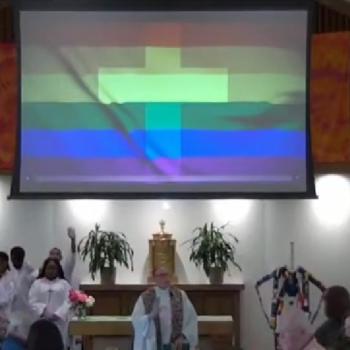Recently, during the installation of a new archbishop in Brazil, a scandal occurred. This scandal purports that a female Anglican minister participated or “concelebrated” in the liturgy of the Eucharist, including receiving communion. Now, faithful Catholics observing this scandal rightly expressed concern. Furthermore, the archdiocese issued a statement apologizing for this “isolated incident of inadvertent violation of liturgical norms” and promising to renew their commitment “to doctrinal orthodoxy and liturgical orthopraxy…”
However, some Catholics may wish to engage in an act of subversion by acknowledging other non-Catholic clergy, especially female ministers, as “ordained priests.” For the record, historically, the nomenclature for a woman is priestess, not priest. Also, liberal Protestant denominations do not hold the distinction as the first institutions to ordain priestesses. The pagan Sumerians, Akkadians, Egyptians, Greeks, and Romans all had priestesses millennia ago.
As an act of charity and as a spiritual work of mercy, below I offer corrections from official Church teaching on ordination to those who may wish, unwittingly or not, to subvert the Catholic Church by supporting the priestesshood.
Inter Insigniores
Issued in 1976, Inter Insigniores lays out the reasons why the Catholic Church cannot ordain or recognize the ordination of women.
Specifically:
- “The Catholic Church has never felt that priestly or episcopal ordination can be validly conferred on women.”
- “…the Church intends to remain faithful to the type of ordained ministry willed by the Lord Jesus Christ and carefully maintained by the Apostles.”
- “Jesus Christ did not call any women to become part of the Twelve.”
Finally:
- “The practice of the Church therefore has a normative character: in the fact of conferring priestly ordination only on men, it is a question of unbroken tradition throughout the history of the Church, universal in the East and in the West, and alert to repress abuses immediately. This norm, based on Christ’s example, has been and is still observed because it is considered to conform to God’s plan for his Church.”
Reader, please notice the strong language used above, such as “never,” “did not,” and “only on men.” Moreover, just because a non-Catholic group refers to a woman as a “priest,” does not conclude that Catholics ought to do likewise, as if we recognize such an ordination as valid.
Ordinatio Sacerdotalis
Eighteen years later (1994), the Church again addressed the issue of women’s ordination to the priesthood in Ordinatio Sacerdotalis. Here, in clear and concise language, the Church declared the impossibility to ever ordain women to the priesthood.
Wherefore, in order that all doubt may be removed regarding a matter of great importance, a matter which pertains to the Church’s divine constitution itself, in virtue of my ministry of confirming the brethren (cf. Lk 22:32), I declare that the Church has no authority whatsoever to confer priestly ordination on women and that this judgment is to be definitively held by all the Church’s faithful.
To those subversives, please note the words “definitively held” in the last sentence. Given such language, how can I, as a faithful Catholic, refer to women as priest(ess)es when the Church teaches the impossibility of such a term?
Catechism of the Catholic Church 1577
Finally, if the two official Church documents above seem unclear, the Catechism of the Catholic Church (1992) also reaffirms the perennial teaching of the Church concerning women’s ordination. In paragraph 1577, we read:
…The Lord Jesus chose men to form the college of the twelve apostles, and the apostles did the same when they chose collaborators to succeed them in their ministry. The college of bishops, with whom the priests are united in the priesthood, makes the college of the twelve an ever-present and ever-active reality until Christ’s return. The Church recognizes herself to be bound by this choice made by the Lord himself. For this reason, the ordination of women is not possible.
To me, when the Church states something “is not possible,” she means that something cannot happen. She does not mean that something is possible somewhere else, like in another faith tradition. No, she means that something cannot happen in all contexts and everywhere. Furthermore, those who claim otherwise do so in subversion to the authority of the Church.
Final Thoughts…
Again, as an act of charity and as a spiritual work of mercy, I implore those subversives to reconsider their position. The Church cannot bestow or recognize women’s ordination. In Catholicism, the priestesshood does not (and cannot) exist.
Thank you!
Read The Latin Right’s other writing here.
Please visit my Facebook page and IM your questions (and follow my page) or topics for articles you would like covered.
Also, please subscribe my YouTube page for updates on upcoming articles.













